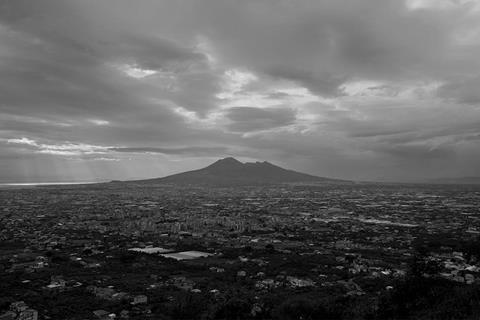Italian filmmaker’s Venice competition title is a strikingly melancholic portrait of the southern Italian city

Dir: Gianfranco Rosi. Italy. 2025. 115mins
To the outsider, Naples is often seen as a city of colour and life, a place of bubbling exuberance. Not so in Giancarlo Rosi’s strikingly melancholic documentary portrait of the southern Italian metropolis. Here another Naples emerges: a city where the living and dead coexist and comingle, where surface certainties are undermined by underground forces both criminal and seismic, where the past derails the present. A city shot in stark, high-contrast black and white, as if bled dry.
Refreshingly untouristy view of sites familiar to foreign visitors
The film sees documentarian Rosi return to Venice competition, where he won the Golden Lion for Sacro GRA in 2013. He also won Berlin’s Golden Bear in 2016 for Fire At Sea. The Lampedusa migrant emergency that underpinned that film gave it an urgency and currency that is mostly lacking in Below the Clouds, but the story Rosi weaves here about Naples as an urban limbo space is still deeply evocative, and not without moments of wry humour.
Certainly it’s a return to form after the director’s last feature, the papal travelogue In Viaggio: The Travels of Pope Francis, which felt like an in-between project, and played out of competition at Venice’s 2022 edition. 01 Distribution will release Below The Clouds (‘Sotto le nuvole’ is its Italian title), in Italy on September 18, following a berth in Toronto, but it seems likely to drift into arthouse berths in other territories too, helped along by its refreshingly untouristy view of sites familiar to foreign visitors – among them Vesuvius, Pompeii, and Naples’ Archaeological Museum.
The film opens with a quote from poet and filmmaker Jean Cocteau: “Vesuvius makes all the clouds in the world”. Here they are in the opening frames, fended by eruptive vomits of lava. We pull back to see the volcano in the distance, viewed at dusk from a beach deserted except for horses racing knee-deep through the surf dragging buggies behind them. The drivers are shadows, just like the passengers on the Circumvesuviana commuter train that acts here as a kind of visual refrain.
In Pompeii, two young boys stare in fascination at one of the plaster casts of the ancient Roman town’s burnt and asphyxiated victims. As filmed by Rosi, these casts hauntingly suggest presence through absence – just like the tunnels dug by Neapolitan archaeological robbers, which lead into buried Roman villas whose ancient murals have been chiselled off the walls. The fire brigade are called in to explore these tunnels, and also need a heavy police escort to put out fires set by bands of masked youths. Emergency services phone operators now double as social workers and psychologists, reassuring terrified callers that there has been no earthquake, no eruption.
Images begin to chime and link hands. A sheet of pumice calving down a volcanic slope recalls another of the film’s recurrent locations – a huge ship, moored in a Neapolitan port and crewed by Syrians, who wade up slopes of grain in the vessel’s huge hold, bearing long-handled brooms which they use to sweep snowfalls of wheat from the tucks and folds of the irregular walls. Sisyphus lives on, in this city founded by Ancient Greek colonists. The fact that as soon as they finish, these patient, resigned, dignified men will head back to war-torn Odessa for another load, gives the knife an extra twist.
As always, Rosi’s style is rigorously observational: in the great underground storerooms of Naples’ archaeological museum, we’re even grateful for a curator’s habit of talking to herself as she illuminates, with a flashlight, huge heaps and forests of statuary. A soundtrack by Daniel Blumberg, the Oscar- and BAFTA-winning composer of The Brutalist, is as sparse and ominous as the city of ghosts that Rosi’s masterful, oneiric documentary paints in shades of darkness and light.
Production companies: 21Uno Film srl, Stemal Entertainment srl, with Rai Cinema
International sales: The Match Factory, sales@matchfactory.de
Producers: Donatella Palermo, Gianfranco Rosi, Paolo Del Brocco
Screenplay: Gianfranco Rosi with the collaboration of Carmelo Marabello, Marie-Pierre Muller
Editing: Fabrizio Federico
Cinematography: Gianfranco Rosi
Music: Daniel Blumberg
























